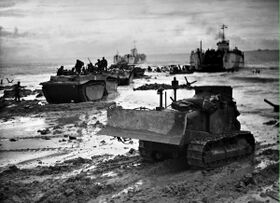Battle of Toulogne
The Battle of Toulogne (20 June 1941 - 21 July 1941) was an attempt by the Imperial forces to expel Rubrumian and Jutlandish forces from Trabia. After the Marives Offensive, the Imperials forced the Teulabian-Trabian forces to retreat 25 km from Marives. The ensuing action had also forced the Commonwealth forces to retreat but to the East, at the Port of Toulogne. The heavily beaten 2nd Division of the Royal Brunswick Army was split in two, the majority of the division retreated with the Telubian-Trabian forces but Brigadier Alexander Fox's 1st Brigade swept up with the Commonwealth forces and found themselves also at Toulogne. Quenminese General Ân Quang Triệu and Russite Marshal Olav Timasheff planned out that Toulogne was the place to either evict or force the Commonwealth forces to surrender. A major surrender at Toulogne would prove vital to the Imperials and seriously disasterous for the Commonwealth forces.
General Triệu planned his strategy out by attacking Toulogne during the High Tide, when almost 2/5ths of the Toulogne Estuary would be flooded, and therefore would force the Commonwealth forces to drown or to flee. As expected, High Tide commenced on the 19th of June. Imperial attacks began the following day but the defenders at Toulogne were prepared. Offensives were carried out from the 20th to the 5th of July. On the 7th, Colonel Tasaku Mitsuru had received a coded message to evacuate from Toulogne and abandon the campaign. However, the Colonel had refused and decided to counter the attack. Withdrawing 1/2 of the defenders at Toulogne, he landed troops on the other side of the Toulogne Estuary when the High Tide was over. On 9 July, the High Tide was over but the Imperials continued to push further into the Port. Mitsuru launched a counteroffensive from the other side and forced the attacking Imperials to fall back from Toulogne. On the 18th, Mitsuru regrouped his forces and pushed into the outskirts of Toulogne, where the Imperials were still regrouping. Seeing that the Commonwealth forces were gaining the upper hand, the Imperials called off their attacks.
The Battle became a crucial point in the Teulabia Campaign and had prevented Commonwealth withdrawal from the country. The following month after the battle, reinforcements and shipments from Rubrum and Jutland started to flow and keep Commonwealth forces reinforced throughout the campaign.
